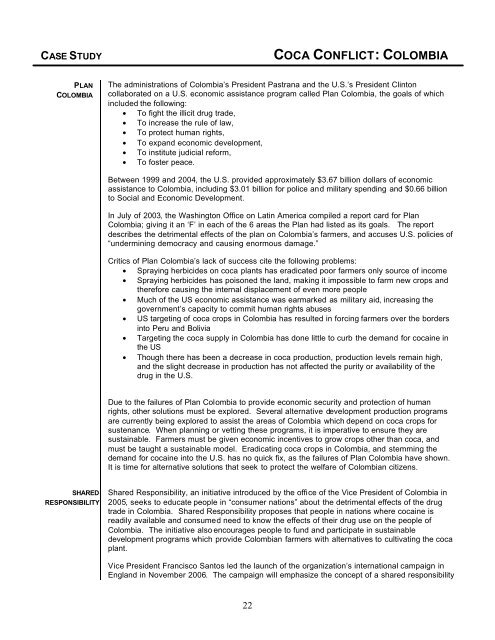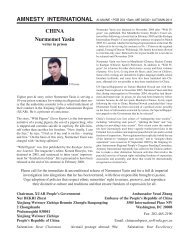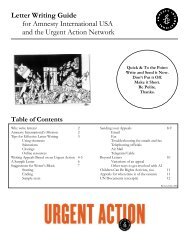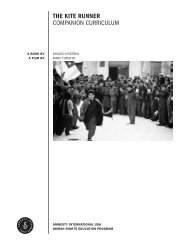Blood Diamond Curriculum Guide (PDF) - Amnesty International USA
Blood Diamond Curriculum Guide (PDF) - Amnesty International USA
Blood Diamond Curriculum Guide (PDF) - Amnesty International USA
You also want an ePaper? Increase the reach of your titles
YUMPU automatically turns print PDFs into web optimized ePapers that Google loves.
CASE STUDY COCA CONFLICT: COLOMBIA<br />
PLAN<br />
COLOMBIA<br />
SHARED<br />
RESPONSIBILITY<br />
The administrations of Colombia’s President Pastrana and the U.S.’s President Clinton<br />
collaborated on a U.S. economic assistance program called Plan Colombia, the goals of which<br />
included the following:<br />
• To fight the illicit drug trade,<br />
• To increase the rule of law,<br />
• To protect human rights,<br />
• To expand economic development,<br />
• To institute judicial reform,<br />
• To foster peace.<br />
Between 1999 and 2004, the U.S. provided approximately $3.67 billion dollars of economic<br />
assistance to Colombia, including $3.01 billion for police and military spending and $0.66 billion<br />
to Social and Economic Development.<br />
In July of 2003, the Washington Office on Latin America compiled a report card for Plan<br />
Colombia; giving it an ‘F’ in each of the 6 areas the Plan had listed as its goals. The report<br />
describes the detrimental effects of the plan on Colombia’s farmers, and accuses U.S. policies of<br />
“undermining democracy and causing enormous damage.”<br />
Critics of Plan Colombia’s lack of success cite the following problems:<br />
• Spraying herbicides on coca plants has eradicated poor farmers only source of income<br />
• Spraying herbicides has poisoned the land, making it impossible to farm new crops and<br />
therefore causing the internal displacement of even more people<br />
• Much of the US economic assistance was earmarked as military aid, increasing the<br />
government’s capacity to commit human rights abuses<br />
• US targeting of coca crops in Colombia has resulted in forcing farmers over the borders<br />
into Peru and Bolivia<br />
• Targeting the coca supply in Colombia has done little to curb the demand for cocaine in<br />
the US<br />
• Though there has been a decrease in coca production, production levels remain high,<br />
and the slight decrease in production has not affected the purity or availability of the<br />
drug in the U.S.<br />
Due to the failures of Plan Colombia to provide economic security and protection of human<br />
rights, other solutions must be explored. Several alternative development production programs<br />
are currently being explored to assist the areas of Colombia which depend on coca crops for<br />
sustenance. When planning or vetting these programs, it is imperative to ensure they are<br />
sustainable. Farmers must be given economic incentives to grow crops other than coca, and<br />
must be taught a sustainable model. Eradicating coca crops in Colombia, and stemming the<br />
demand for cocaine into the U.S. has no quick fix, as the failures of Plan Colombia have shown.<br />
It is time for alternative solutions that seek to protect the welfare of Colombian citizens.<br />
Shared Responsibility, an initiative introduced by the office of the Vice President of Colombia in<br />
2005, seeks to educate people in “consumer nations” about the detrimental effects of the drug<br />
trade in Colombia. Shared Responsibility proposes that people in nations where cocaine is<br />
readily available and consumed need to know the effects of their drug use on the people of<br />
Colombia. The initiative also encourages people to fund and participate in sustainable<br />
development programs which provide Colombian farmers with alternatives to cultivating the coca<br />
plant.<br />
Vice President Francisco Santos led the launch of the organization’s international campaign in<br />
England in November 2006. The campaign will emphasize the concept of a shared responsibility<br />
22






